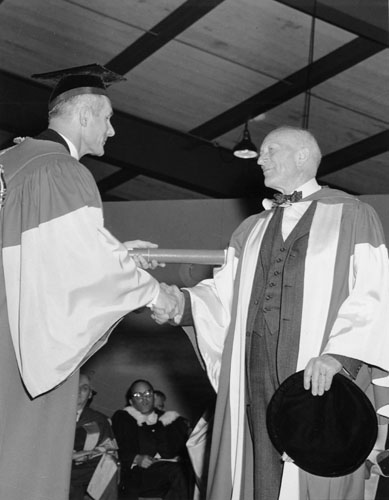1963 Fredericton Encaenia
Penfield, Wilder Graves
Doctor of Science (D.Sc.)
Orator: Cattley, Robert E.D.
Image Caption
L to R: Colin B. Mackay, Wilder Graves Penfield
Second Image Caption
Source: UA PC-4 no.11k; Photo by Harvey Studios
Citation:
ENCAENIA, MAY, 1963
WILDER GRAVES PENFIELD
to be Doctor of Science
On this platform are three whose individual genius will grace the Centenary of our Associated Alumni. One is a Princetonian, one a Rhodes Scholar, and the third, who stands before you, is both.
We do not presume, in Wilder Penfield, to honour the world-famous neurologist. The Medical profession has long since crowned its second Hippocrates with laurels not ours to bestow.
We reserve our admiration for the Penfield who, like a beacon on the headland of Science, sheds on all around the glow of the Humanities -- especially on doctors; who has an abiding interest in people, little or great; who advocates foreign languages for the very young and a second career for those who are too old to work but, like himself, are capable of embarking on several with zest; who sagely surveys the world of education, searching for a climate ideal for its Canadian flowering.
The broad sweep of his vision has rested on the twin peaks of Greece and the Renaissance. What common climate was it, he asks, that nurtured, amid a profusion of their kind, a Phidias and a Michaelangelo, a Thales and a Galileo, an Aristotle and a Leonardo? He finds it in those independent city states, be it Florence or Athens, Miletus or Milan, with their sharp artistic rivalries and that sovereign elixir compounded of freedom of spirit, training for excellence, and leisure for creation.
Can such a climate be for Canada? Years ago Penfield decried in other countries those extremes in education -- centralized control and passive parochialism. To him came the idea that our "sprawling Provinces", as he calls them, should be our city states, to guide and to support our teaching; that the Federal government, supplementing the Medicis and Sforzas of our day, should endow research; and that both should combine to foster general learning by capitalized grants for libraries and laboratories, travel, conventions, and fellowships.
He must rejoice at the steady realization of his vision. The Provinces guard (with an Hellenic, nay, a Mediaeval jealousy) their control of education. Two great Councils sagaciously infuse lifeblood into the arteries of Science and the Humanities; and the newly elected Prime Minister has foreshadowed a master plan for national scholarships.
Penfield's climate is in the making. It is for Canadian youth to justify the vision, as it is for this University to enrol the person, of their distinguished prophet.
From:
Cattley, Robert E.D. Honoris causa: the effervescences of a university orator. Fredericton: UNB Associated Alumnae, 1968.
WILDER GRAVES PENFIELD
to be Doctor of Science
On this platform are three whose individual genius will grace the Centenary of our Associated Alumni. One is a Princetonian, one a Rhodes Scholar, and the third, who stands before you, is both.
We do not presume, in Wilder Penfield, to honour the world-famous neurologist. The Medical profession has long since crowned its second Hippocrates with laurels not ours to bestow.
We reserve our admiration for the Penfield who, like a beacon on the headland of Science, sheds on all around the glow of the Humanities -- especially on doctors; who has an abiding interest in people, little or great; who advocates foreign languages for the very young and a second career for those who are too old to work but, like himself, are capable of embarking on several with zest; who sagely surveys the world of education, searching for a climate ideal for its Canadian flowering.
The broad sweep of his vision has rested on the twin peaks of Greece and the Renaissance. What common climate was it, he asks, that nurtured, amid a profusion of their kind, a Phidias and a Michaelangelo, a Thales and a Galileo, an Aristotle and a Leonardo? He finds it in those independent city states, be it Florence or Athens, Miletus or Milan, with their sharp artistic rivalries and that sovereign elixir compounded of freedom of spirit, training for excellence, and leisure for creation.
Can such a climate be for Canada? Years ago Penfield decried in other countries those extremes in education -- centralized control and passive parochialism. To him came the idea that our "sprawling Provinces", as he calls them, should be our city states, to guide and to support our teaching; that the Federal government, supplementing the Medicis and Sforzas of our day, should endow research; and that both should combine to foster general learning by capitalized grants for libraries and laboratories, travel, conventions, and fellowships.
He must rejoice at the steady realization of his vision. The Provinces guard (with an Hellenic, nay, a Mediaeval jealousy) their control of education. Two great Councils sagaciously infuse lifeblood into the arteries of Science and the Humanities; and the newly elected Prime Minister has foreshadowed a master plan for national scholarships.
Penfield's climate is in the making. It is for Canadian youth to justify the vision, as it is for this University to enrol the person, of their distinguished prophet.
From:
Cattley, Robert E.D. Honoris causa: the effervescences of a university orator. Fredericton: UNB Associated Alumnae, 1968.
Citations may be reproduced for research purposes only. Publication in whole or in part requires written permission from the author.
